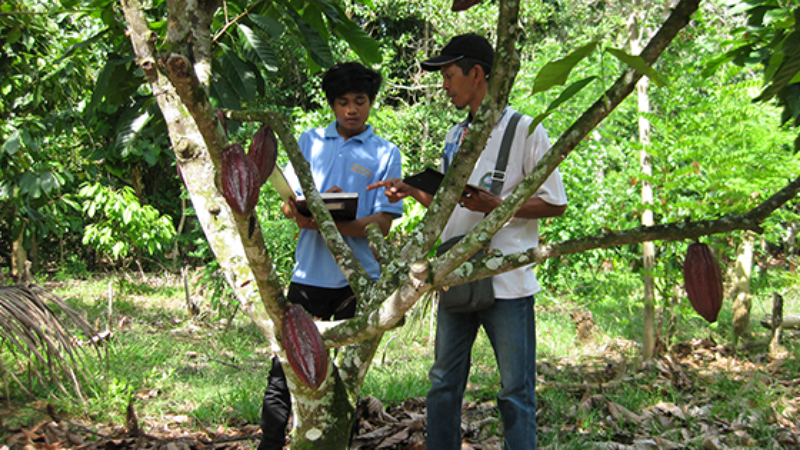by Former International Plant Nutrition Institute (IPNI) in collaboration with local sustainability program Cocoa Care
Description
Cocoa is a key crop for many Indonesian smallholder farmers, who own more than 90% of the country’s plantations. In recent years, however, a combination of ageing trees, pests, diseases, poor soil health and nutrient depletion has seen cocoa bean yields fall from around 750kg/ha in the 1980s to below 400 kg/ha over the last two decades.
Despite producing 65% of Indonesia’s output, smallholders in Sulawesi have poor knowledge of cocoa farming and limited access to farm inputs such as fertilizers and finance. Many of them are in a downward spiral of poverty, with some ready to give up growing cocoa entirely despite increasing global demand.
In 2013, a project was launched to train smallholder cocoa farmers in Sulawesi and demonstrate the benefits of proper nutrient management and develop local fertilizer recommendations.
Farmers and their families were trained in 4R Nutrient Stewardship management practices – applying the Right nutrient source, at the Right rate, at the Right time, in the Right place – alongside other best management practices (BMP) for cocoa farms, such as pest management and pruning.
In addition, they received farm tools, fertilizer, compost and high-quality cocoa tree seedlings and family members were taught business management. Participating farmers were also assigned Cocoa Carers – well-trained and experienced local cocoa farmers with model farms of their own to demonstrate BMP and yield potential.
Results
The project showed that BMP and balanced fertilization increased both the yield and quality of cocoa, ensuring a sustainable income for cocoa farming families. BMP created improvements within three months while adding 4R managed fertilizers produced average yields of over 1,000 kg/ha, over twice the regional average of 500 kg/ha.
With most cocoa traditionally harvested in Sulawesi between June and August, limited cash income usually restricts farmers’ ability to invest in inputs for the rest of the year. Participating farmers, however, could produce crops regularly throughout the year, ensuring a continuous cash flow to reinvest and spend on food.
By producing high yields of superior quality, commercially viable cocoa beans, the project helps smallholder farmers, their families and the surrounding rural area benefit economically.
Working closely with local smallholder farmers and encouraging knowledge transfer, the project ensures that the wider agricultural community can also benefit from improved practices.
By teaching farmers responsible for 4R nutrient management and best practices for soil health, the project helped protect the environment by ensuring that nutrient losses are minimized, and the soil is healthy, increasing its ability to store water and carbon.
The project has also helped to identify the most appropriate fertilizer formulations and management practices to help Sulawesi cocoa farmers increase their yields.
Climate smartness*
First, it is worth highlighting the involvement of experienced farmers and an expert on cocoa management through the implementation
of the project, as this can improve the future sustainability of the initiative and it is also an effective strategy to use with the intention for further scaling of the practices.
With respect to the CSA pillars (adaptation, mitigation and production), the optimal application of fertilizers to plants, mainly nitrogen, helps to reduce greenhouse gas emissions, especially nitrous oxide (mitigation). Moreover, by reducing investments in fertilizers, the total income of the producers’ increases, which also increases the productivity of the cocoa crop.
The project may benefit from building capacity processes to increase farmers’ knowledge on climate, its use for crop planning and management. This will definitely increase the ability of farmers to make better-informed decisions on their agricultural activities using weather forecasts and understanding the potential implications in terms of crop losses, as well the measures they may need to take to reduce negative effects.
*This is done in the framework of climate-smart agriculture (CSA) approach. Climate-smartness in agriculture means understanding impacts of climate change and variability along with the agricultural activity, which includes the planning of what crop to plant, when to plant, what variety to plant and what type of management practices are needed to reduce the impact on the environment (e.g. emissions reduction), maintain or increase productivity (e.g. yields) while increasing resilience and improving livelihoods.


